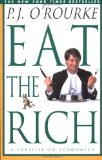Summary | Excerpt | Reviews | Readalikes | Genres & Themes | Author Bio

Critics' Opinion:
Readers' Opinion:
First Published:
Sep 1998, 240 pages
Paperback:
Sep 1999, 255 pages
I turned into a square myself, of course, as everyone who lives long enough
does. I got a job as a journalist--but without ever considering that journalism
was a business. (Although I would have been unpleasantly surprised to get a hug
instead of a paycheck at the end of the week.) And I continued to ignore
economic issues even though I had a press pass to the most spectacular
extravaganza of economics in this century.
It was the 1970s, and the economy was changing almost as often as bed
partners. The Great Depression may have been more dramatic, but it was a
one-trick pony. In the '70s, globalization suddenly included the other
three-quarters of the globe. The places that used to make our windup toys were
making our automobiles. Everything was being imported--except oil, which had
hitherto been given away free with a windshield wash and a set of highball
glasses at most brand-name gas stations. Then, one day, you couldn't buy oil for
money. Not that there wasn't plenty of money around in the '70s. It just didn't
happen to be worth anything. We had a previously unimaginable combination of
fever inflation and hypothermia business slump. You could make more money buying
Treasury bills than you could make breaking into the Treasury. The gold standard
disappeared from the scene. Maybe it joined a cult. International
currency-exchange rates were determined with mood rings. The most powerful
nations in the world had, at their helms, an amazing collection of economic
nincompoops--Nixon, Carter, Mao, Harold Wilson, Georges Pompidou, Leonid
Brezhnev. And the electronic-media revolution was under way so that bad ideas
about economics were spreading around the world at neural speed.
I dozed through it. And I was covering politics, too. Even I realized that
money was to politicians what the eucalyptus tree is to koala bears: food,
water, shelter, and something to crap on. I made a few of the normal
journalistic squeaks about greed and self-interest, and let the thing slide.
It wasn't until the 1990s, when I'd been a foreign correspondent for ten
years, that I finally noticed economics. I noticed that in a lot of places I
went, there wasn't anything you'd call an economy. And I didn't know why. Many
of these countries seemed to have everything--except food, water, shelter, and
something to crap on.
I decided to go back to the Econ texts I'd finessed in college and figure
things out. And my beatnik loathing returned full-blown. Except this time it
wasn't the business majors I despised; it was the authors of the books they'd
had to study. It turns out that the Econ professors were economic idiots, too.
Looking into a college textbook as an adult is a shock (and a vivid reminder
of why we were so glad to get out of school). The prose style is at once puerile
and impenetrable, Goodnight Moon rewritten by Henry James. The tone
varies from condescension worthy of a presidential press conference to sly
chumminess worthy of the current president. The professorial wit is duller than
the professorial dicta, and these are dulled to unbearable numbness by the need
to exhibit professorial self-importance. No idea, however simple--"When
there's more of something, it costs less" --can be expressed without
rendering it onto a madras sport coat of a graph and translating it into a rebus
puzzle full of peculiar signs and notations. Otherwise the science of economics
wouldn't seem as profound to outsiders as organic chemistry does. And then,
speaking of matters economical, there's the price of these things--$49.95 for a
copy of Economics, fifteenth edition, by Paul A. Samuelson and William D.
Nordhaus.
Economics has been, as its edition number indicates, in use as an Econ
text forever--that is, since 1948, which counts as forever to the baby-boom
generation. The book is considered a fossil by many economists, but it has been
translated into forty-six languages, and more than 4 million copies have been
sold. Economics was what the current leaders of international business
and industry were afflicted with in school. And here was another shock.
Professor Samuelson, who wrote the early editions by himself, turns out to be
almost as much of a goof as my friends and I were in the 1960s. "Marx was
the most influential and perceptive critic of the market economy ever," he
says on page seven. Influential, yes. Marx nearly caused World War III. But
perceptive? Samuelson continues: "Marx was wrong about many things ... but
that does not diminish his stature as an important economist." Well, what
would? If Marx was wrong about many things and screwed the baby-sitter?
From Eat the Rich, by P. J. O'Rourke. © September 1998 , P. J. O'Rourke. Used by permission.





The Flower Sisters
by Michelle Collins Anderson
From the new Fannie Flagg of the Ozarks, a richly-woven story of family, forgiveness, and reinvention.

The House on Biscayne Bay
by Chanel Cleeton
As death stalks a gothic mansion in Miami, the lives of two women intertwine as the past and present collide.

The Funeral Cryer by Wenyan Lu
Debut novelist Wenyan Lu brings us this witty yet profound story about one woman's midlife reawakening in contemporary rural China.
Your guide toexceptional books
BookBrowse seeks out and recommends the best in contemporary fiction and nonfiction—books that not only engage and entertain but also deepen our understanding of ourselves and the world around us.